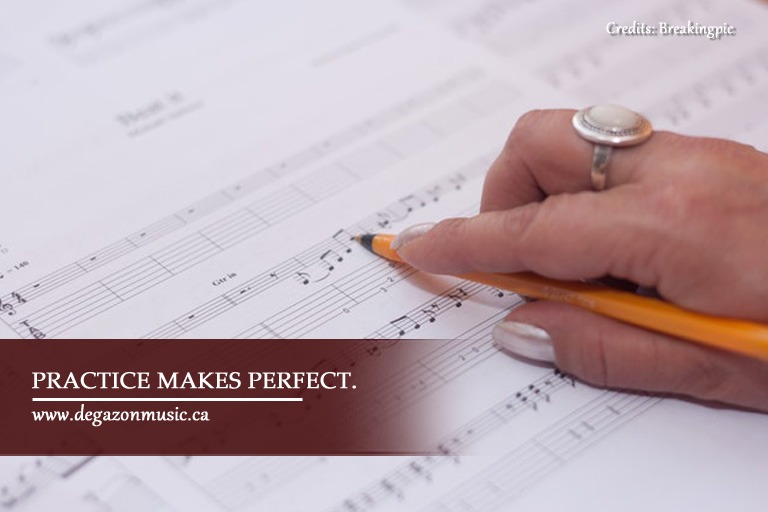How to Prepare for Your First Singing Lesson

So you’ve finally decided (or perhaps planning) to sign up for your first voice lesson. Whatever the case, you want to level your expectations and come prepared for it. There’s nothing to feel anxious about: your vocal coach won’t hurt you! In fact, they will do everything to make your first singing learning experience a positive one.
Your initial lessons will most likely be about you and your teacher getting to know each other. Every voice teacher approaches teaching in different ways, but singing lessons for beginners will likely involve a quick discussion and vocal assessment.
We’ve come up with a handy guide to help you better prepare for your upcoming singing lesson with ease and confidence. Read on to learn more.
Create Personal Expectationst

Before heading to your lessons, take time to set proper expectations so you can make the best out of it. Here are some factors you may want to consider:
Set Vocal Goals For Yourself
Whether you’re taking up one-on-one or online singing lessons, getting clear about why you’re dipping your toes into singing will aid you and your teacher in shaping your lessons as well as set benchmarks for your progress. This also helps you to have a better understanding of what specific benefits of singing lessons you are looking to experience.
There are many goals you can commit to throughout your voice lessons: is it to be able to sing a particular song on key, enhance your musicality, sing a string of performances without losing your voice, or learn to sing a specific genre (pop, musical theatre, or opera)? Remember to establish concrete goals that will keep you motivated and be inspired to make progress. On top of these, your vocal coach may want to know the following before you start with your lessons:
- Experience level – Do you have previous singing experiences? Have you ever joined a choir? Have you taken voice lessons in the past?
- Your musical preference -What genres or types of music do you prefer to sing? Do you like pop, musical, opera, or theatre? Are you open to exploring classical music as a pedagogical tool?.
- Possible vocal issues – Are there particular vocal challenges that you’d like to overcome? Do you often run out of breath when you sing? How about tension issues?.
Be Ready To Have Your Voice Assessed

Vocal assessments are a critical component in any singing lessons. Finding your voice and getting acclimated to it allows your teacher to deeply understand how they can help you progress in your singing. Vocal assessments aim to determine the following:
- Range -To measure your vocal range, your coach may ask you to go up and down the scale. Once this has been identified, you’ll need to take note of it so you and your teacher can easily recognize your progress as your range expands.
- Song sample -Many people sing differently during vocal exercises and performing. Your teacher will likely have you sing a piece to learn the variations in your voice.
In this assessment, the teacher will pay attention to your strong and weak points. She will observe your breathing, posture, the positioning of your soft palate, harmful tension, diction, pitch accuracy, tone quality, resonance, and musicality. Your teacher’s observations during this assessment usually become the focus of your initial voice lessons.

Prepare To Dig Deep
Performing a song is more than just hitting the right notes; it also involves digging deep into the meaning/message of the lyrics you’re singing. You’ll need to pour in more work like analyzing, translating, and conveying your personal interpretation of the song to deliver the best performance. As you go along, you will discuss these aspects in detail with your vocal coach.

Decide On The Songs You’ll Sing
Much of your song choice will have to revolve around the goals you’ve established at the beginning. Your teacher will have ready song suggestions and might recommend you buy certain books. This is to provide you with supplemental learning that will help you whet your craft.
Some vocal repertoire books include opera, folk songs, Broadway, and a lot more. You might be open to singing in another language as you stretch your goals along the way. Consider various possibilities that can expand your vocal abilities.
Singing Tips:
As you carve your path towards a much improved singing prowess, here are some reminders as you begin your lessons:
- Breathe -Singing is a whole-body activity. Banking entirely on your vocal cords to reach notes can result in pain and strain. If you feel a painful sensation in your throat, you’re not applying proper singing techniques. Sing with your diaphragm. This requires maintaining a good posture so you can sing properly whether you’re sitting or standing.
Take advantage of learning
- (essential skills every aspiring singer must master) as you go along your voice lessons. Proper breathing involves using enough air to hit the notes right and finish an entire note without trailing off or cutting it short.
- Warm up -Your vocal cords are a muscle that needs to undergo stretching before being worked out. Vocal warm-ups allow you to sound better. It’s also during warm-ups that your teacher gets reminded of the areas you need to improve on in relation to expanding your range. A quick warm-up is enough to prime your vocal cords before you sing.
- Take good care of your voice – Neglecting your vocal cords can lead to health issues. Just like how any instrument should be maintained to keep it in great condition, your voice needs maintainingtoo. Prioritize rest and make sure to drink plenty of water before and after singing. Avoid smoking as this can damage your vocal cords and your body.

- Practice -Try to warm-up and be diligent in doing the assignments given by your teacher (at least 30 minutes each day). If you prefer to practice your singing for extended hours during the day, make sure to take long breaks between sessions to avoid straining. Skip practices when you’re not feeling well.
- Have fun! -The key to getting the most out of your singing lessons is to enjoy every moment of it. When you’re having fun, it becomes natural for you to put in the energy to improve your skills and use your ability to benefit others around you.
If you’re looking for singing lessons for children and adults near you, we’d love to be at your service. DeGazon Music Studios offers instruction for eager students looking to try out music and dance. Our goal is to instill a lifelong love for your chosen craft that you can take with all your life.
Give us a call at (416) 527-3769 x1 to register for dance classes or music lessons. You can also fill out our online form to request further information about our classes and get a FREE trial lesson.
